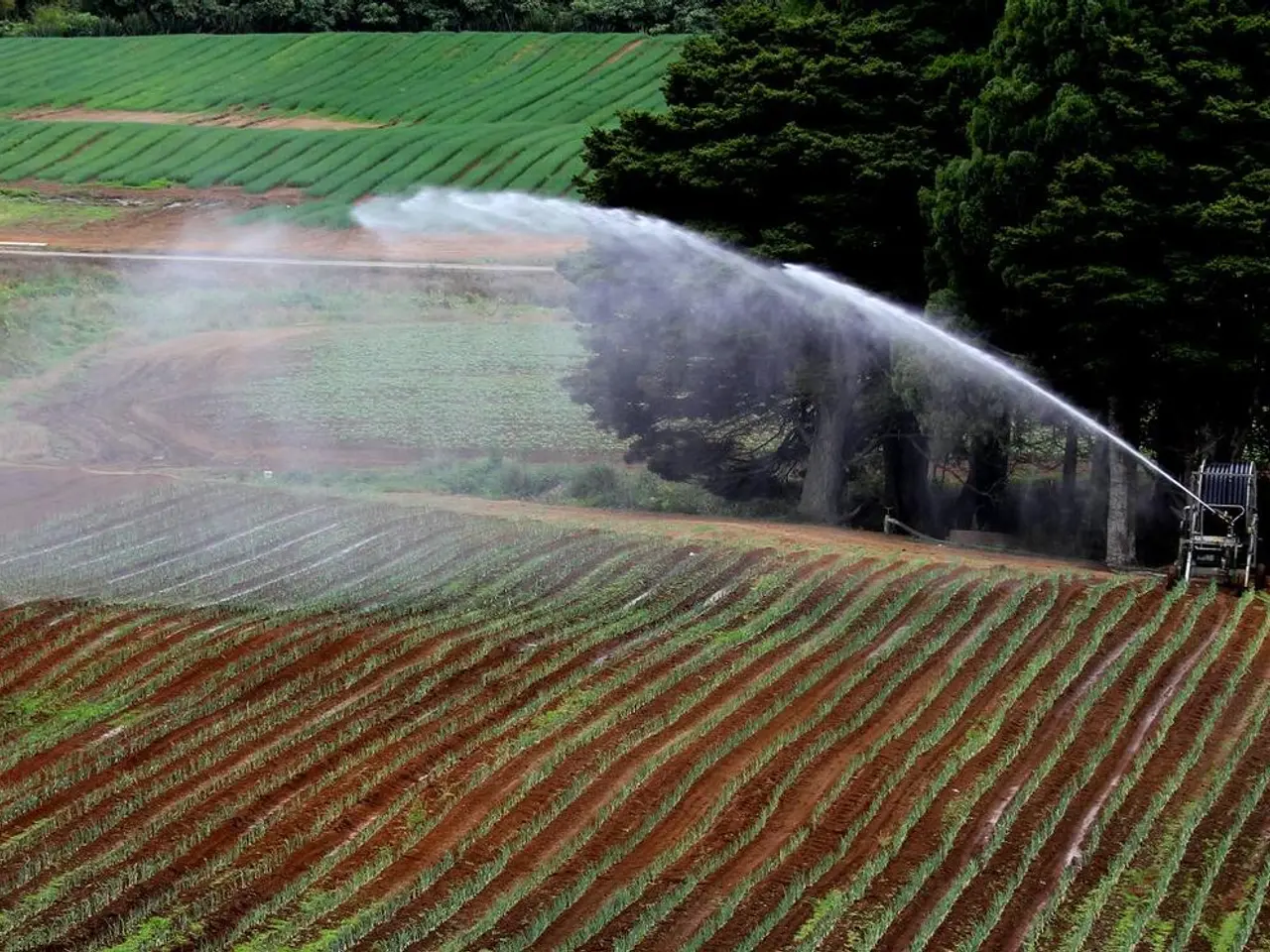City-Dwellers Embrace Agricultural Life in Rural Areas for Future Prospects
Bengaluru's Tech Professionals Embrace Sustainable Farming Collectives
In the bustling city of Bengaluru, India's IT capital, tech professionals are taking a significant step towards reducing their carbon footprints. They are forming or collaborating with sustainable farming collectives that blend grassroots regenerative practices with cutting-edge technology solutions for precision agriculture, circular economies, and community-led environmental stewardship.
One such collective is the Tamarind Valley Collective (TVC), founded by Varun Pandey and Yathesh Kumar near Denkanikottai. TVC employs at least four families and works closely with villagers, building community and increasing access to chemical-free food and education for children. At TVC, 52 families work towards balancing farm-to-table culture with the lifestyle of villagers in Thaggatti.
These farming collectives are not just about agriculture; they are about promoting environmental responsibility and accountability. Shannon Olsson, director of the Echo Network, supports urban farming and farming collectives for their potential to create awareness and build a deep connection between people and their land.
The collectives use sustainable methods such as solar energy, rainwater for crops, and restorative farming. Tech professionals implement regenerative agriculture practices, leveraging digital farm management technologies, and supporting farmer-led community initiatives that reduce carbon footprints and promote local, eco-friendly food systems.
Key ways they do this include participating in or supporting regenerative farming collectives that focus on natural farming, soil health restoration, and composting. They also use technology-driven farm management platforms developed locally in Bengaluru to optimize farming operations sustainably. Adopting innovative sustainable farming techniques such as biochar production, biogas plants, and integrated waste-to-resource systems are also part of their strategies.
Moreover, these farming collectives promote urban consumers' direct involvement by enabling farm-to-fork supply chains, composting at home, and supporting cooperative models that connect tech professionals in cities like Bengaluru with nearby regenerative farms. Incorporating AI and digital advisory tools, such as AI-driven monitoring for climate-adaptive crop management and traceability platforms, also enhances agricultural sustainability and economic viability.
India, with more than half of its 1.3 billion people depending on agriculture for a living, is also seeing a shift towards sustainable farming. Government initiatives have created Farmer Producer Organizations (FPOs) to support farmers with technology and financial assistance, and connect them to fair price markets for their produce. FPOs now focus on teaching practices like using biochar to enrich soil and prevent burning agricultural residues, which release carbon into the air.
However, farmers' protests in India are gaining momentum due to various issues, including corporatization of produce, farmer suicide rates, poverty, and class oppression. India is expected to have a rapidly rising carbon footprint in the coming years, and the city of Bengaluru is experiencing severe traffic congestion, with residents spending up to three hours a day in traffic. The city's Air Quality Index averages 110, which is unhealthy for sensitive populations. India is the world's third-largest greenhouse gas emitter.
Navin Horo, national project coordinator of the Climate Change Knowledge Network in Indian Agriculture, suggests that urban farmers engaging with local farmers can help handle socioeconomic aspects of environmental issues. Olsson emphasizes the importance of eating locally to reduce food miles and cut greenhouse gas emissions.
Currently, at least six farming collectives are operational in the outskirts of Bengaluru. One such farming collective is Vanam Farms, an 8.5-acre farm in Belalam village. These initiatives are a testament to the growing movement of tech professionals who are choosing to live sustainably and contribute to a greener future.
- Tech professionals in Bengaluru are gravitating towards sustainable farming collectives that melds traditional regenerative practices with advanced technology for precision agriculture.
- Tamarind Valley Collective (TVC) is one such initiative, established by Varun Pandey and Yathesh Kumar, which employs local families and collaborates with villagers for chemical-free food and education.
- Shannon Olsson, director of the Echo Network, advocates for urban farming and farming collectives as tools to foster environmental awareness and strengthen relationships between people and their land.
- Sustainable methods employed by these collectives include solar energy, rainwater farming, and restorative practices.
- Tech professionals apply regenerative agriculture principles, integrating digital farm management technologies and supporting community-led initiatives to minimize carbon footprints and bolster local, eco-friendly food systems.
- The farming collectives encourage urban consumers to directly engage in their efforts, promoting farm-to-fork supply chains, home composting, and cooperative models linking city-dwellers with nearby regenerative farms.
- Adoption of innovative sustainable farming techniques, such as biochar production, biogas plants, and waste-to-resource systems, are pivotal components in their strategies.
- India, with a majority of its population reliant on agriculture, is witnessing a burgeoning shift towards sustainable methods, spurred by government initiatives like Farmer Producer Organizations (FPOs).
- FPOs assist farmers with technology and financial aid, connecting them to fair price markets, and instructing practices such as biochar use to enrich soil and prevent the burning of agricultural residues.
- However, farmers' protests are escalating in India, driven by concerns over corporatization, farmer suicides, poverty, class discrimination, and a mounting carbon footprint.
- Bengaluru is confronting significant traffic congestion, with residents spending up to three hours daily in traffic, and an Air Quality Index averaging 110, which poses health risks to sensitive populations.
- India ranks among the world's top three greenhouse gas emitters.
- Navin Horo of the Climate Change Knowledge Network in Indian Agriculture believes that urban farmers partnering with local farmers can aid in tackling socioeconomic facets of environmental challenges.
- Several farming collectives, including Vanam Farms, span the outskirts of Bengaluru, symbolizing the expanding movement of tech professionals committed to living sustainably and fostering a greener future.




